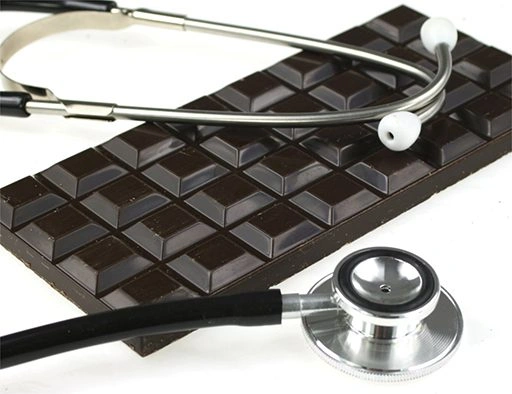Healthy chocolate. Sounds like something out of a sci-fi movie, doesn’t it? Chocolate can’t be good for you, right?
Well, it can, in a way, you just need to know what type of chocolate you should be eating and how much of it you can have.
Let’s face it, chocolate is perhaps the ultimate comfort food. When you are stressed out, eating chocolate somehow makes you feel better and when things are going well, it can make a good thing even better. Chocolate can even elicit feelings of romance (why else do men give women chocolate as a gift?)
Healthy Chocolate?
Healthy chocolate sounds like an oxymoron, right up there with honest politician, but the very latest research says that eating chocolate has more benefits than most people are aware of.
A Sweet but Short History Lesson on Chocolate
Chocolate goes back at least to the ancient Mayans of Southern Mexico and probably even before that. However, the chocolate we think of today is nothing like the Mayan chocolate of yesteryear.
Chocolate is actually the seeds of the cacao tree, native to Central and South America. Cacao beans are dried and roasted, then crushed to make a powder.
The Mayans didn’t just love cacao, they almost worshipped it. The Mayan people used it in celebrations, as a means of finalizing important transactions, and it was consumed at nearly every meal! The chocolate drink the Mayans loved was thick, foamy, and was often flavored with honey or even chili peppers!

When the Aztecs got a hold of chocolate, they took their love of it to a new level. The Aztecs thought that anything this good must have come from the gods. Cacao beans were used as a type of currency and considered far more valuable than mere gold.
It is unknown how chocolate came to Europe. Some say it was brought by Columbus, but others say that it was the Spanish Conquistador Hernan Cortes, who not only brought cacao beans back with him, but guarded them like a precious secret.
No matter how they reached Europe, by the late 1500s, chocolate was a main export of Spain and it reached what is now the state of Florida aboard a Spanish ship in 1641.
America’s love affair with chocolate has been a serious affair ever since.
OK, But is Chocolate Good for Your Health or Not?
Well, if you scarf down a half pound a day, no. However, this isn’t to say that chocolate isn’t without its benefits.
Then Is It OK to Eat Chocolate Every Day?
Yes, it is, as long as you eat the good kind and you eat it in moderation, there are 5 almost unbelievable health benefits to eating chocolate.
What Do You Mean, the “Good Kind” of Chocolate?
This means eating dark chocolate that contains at least 70% cocoa. All the other types of chocolate bars are sad to hear this, but the added sugar, honey, and butter are NOT good for you.
What are the benefits of eating chocolate every day? We thought you would never ask!
Dark Chocolate Nutrition
While it sounds counterintuitive to every idea you have about chocolate, dark chocolate has a fairly impressive profile when it comes to nutrition.
An average 3.5 ounce (100 grams) of dark chocolate contains:
- 11 grams of fiber
- 98% of your recommended daily allowance of manganese
- 89% of your RDI for copper
- 67% of your RDI for iron
- 58% of your RDI for magnesium
- A fair percentage of zinc, selenium, and potassium as well
We also have to mention that the same bar of dark chocolate has a whopping 600 calories!
Are you ready to discover dark chocolate’s benefits when it comes to your health?

Thing #1-It’s Actually Good for Your Entire Cardiovascular System
We see you over there, shaking your head at this one. This is one of those strange but true facts; studies like this one say that dark chocolate can restore flexibility to the blood vessels and arteries. It was also found to prevent white blood cells from sticking to the blood vessel walls, both of these items are common causes of clogged arteries.
Talk about a sweet way to sweep out your circulatory system!
Thing #2-It Lowers Cholesterol & Reduces the Risk of Heart Disease
Dark chocolate has compounds that prevent the oxidation of LDL cholesterol. In addition to the benefit listed above, less cholesterol means a lower risk of heart disease. One study found that dark chocolate reduced the risk of dying from heart disease by an incredible 50% over the course of this 15 year study.
Show your heart a little love and give it some dark chocolate this week!
Thing #3-Chocolate is Great for Expecting Mothers & Their Babies
If you are pregnant and you are craving sweets like chocolate, we have some welcome news! Eating dark chocolate is oh so good for you and your little one.
One study found that eating dark chocolate improved the blood flow to the arteries in the uterus. This improved blood flow helps the placenta develop and function normally, which can lead to good pregnancy outcomes.
It is important to note that pregnant women should only consume dark chocolate during the first two trimesters and NOT the third trimester. Speak to your obstetrician before making any changes to your diet.
Thing #4-It Can Prevent Diabetes

You would never associate chocolate or any type of sweets with diabetes prevention, but when it comes to dark chocolate, it’s a game changer!
Dark chocolate, when consumed in moderation of course, can delay or even prevent the development of diabetes by improving insulin sensitivity. In fact, this 2005 study also found that not only did dark chocolate help delay diabetes, but it lowered blood pressure as well.
So, the next time someone wants to get on your case for eating (dark) chocolate, you can simply explain that you are beating diabetes at its own game.
Thing #5-Chocolate is Great Brain Food
If you think noshing on chocolate makes you feel good, wait until you hear what it does for the brain.
Dark chocolate improves blood flow to the brain, which can increase its overall function. After just 5 days of consuming a small amount of dark chocolate daily, subjects in this study had significantly improved the amount of blood that reached the brain.
It might even help to improve the cognitive function in the elderly, improving verbal skills while it helps improve their overall health, according to this study involving 90 elderly patients.
Important Note
Like most things in life, chocolate needs to consumed in moderation to be healthy. In this case, moderation means about 1 ounce per day. The average sized chocolate bar contains about 3.5 ounces, so be sure to split that beautiful bar of chocolate into thirds and enjoy one piece each day!
Also, be aware that a great deal of the chocolate for sale is not healthy and it is not high quality. Always check the label and be certain that that dark chocolate you are buying contains a 70% or higher cocoa content.
There are sometimes several different types of cocoa printed on the label, including cocoa nibs, cocoa butter or cocoa powder. All are perfectly healthy additions in a dark chocolate bar.
You should also avoid any dark chocolate which calls itself Dutched or that states it has been processed with alkali. Treating dark chocolate with alkali reduces some of the bitter taste, but it also greatly reduces the healthy antioxidants.
While it’s true that dark chocolate has some sugar, it contains far less than the average milk chocolate bar. Look for a dark chocolate brand that has sugar listed as the last or next to the last ingredient on the list. Usually, the higher the percentage of cocoa the chocolate has, the less sugar it contains.
Are There any Advantages of Diary Milk Chocolate?
While dark chocolate might seem to get all the attention, what if you aren’t a fan of dark chocolate? Do you need to learn to love it, or does milk chocolate have any benefits at all?
Well, it might. In a meta-analysis of more than 20,000 people in Scotland, researchers found that over the 11-year study period, those who at the most chocolate (most of it was milk chocolate) had a lower risk of developing heart disease than those who ate little or no chocolate.
Of course, perhaps healthy people are simply more prone to eat chocolate, it’s hard to say.
Regardless, even if you decide to indulge your love of milk chocolate, the rules of moderation still apply. Try to eat no more than one ounce per day for best results.
Wondering What Other Healthy Habits You Should Adopt?

The friendly chiropractors at Better Health Chiropractic and Physical Rehab (who happen to be chocolate lovers themselves) would like you to know that if you are curious as to what other healthy habits you should adopt, if you are getting the right kind of exercise, or if you are wondering if chiropractic care might be right for you, they would be happy to offer you their advice.
Regular chiropractic care can improve your health in so many ways. Our clinics are open late and offer a wide variety of services. We have 4 locations to serve you and offer same day appointments, as well as our 10-minute wait promise.
Call today for an appointment or you can click here to make an appointment online.
Good health isn’t expensive, it’s priceless, so be sure to take good care of it!










